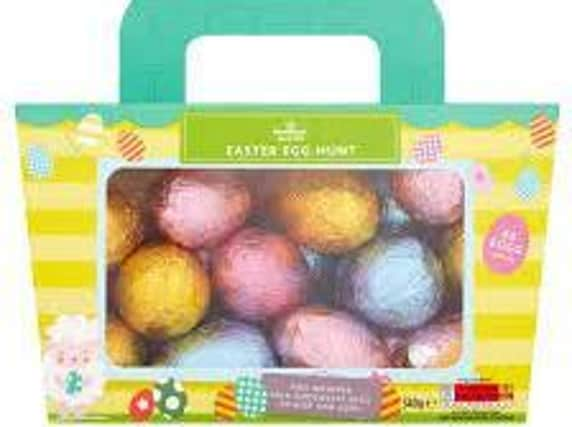Easter eggs hit as grocers focus on staple goods


The number of Easter confectionery products out of stock in supermarkets stands at 25 per cent, up from 11 per cent in the same week before Easter Sunday in 2019, according to the latest data from research firm Edge by Ascential.
In the week ending April 5, availability of Easter confectionery products, including Easter eggs, was 75 per cent, compared with 89 per cent in stock during the same week before Easter Sunday in 2019.
Advertisement
Hide AdAdvertisement
Hide AdAll supermarkets had greater levels of unavailable Easter confectionery except for Sainsbury’s, which had restrictions in place allowing shoppers to purchase a maximum of three Easter eggs. However, this restriction was lifted on Monday.
There are also fewer ranges on offer this year, with all grocery retailers apart from Ocado selling 3 per cent fewer lines.
Supermarkets have replaced Easter eggs with staple items that have been in high demand over the last four weeks. This has followed stockpiling among many consumers, sparked by fears around the worldwide spread of the Covid-19 virus, which has seen British consumers instructed by the Government to remain at home in a bid to control the spread.
Analysts at Edge by Ascential said measures to control purchasing have started to show signs of improvement.
Advertisement
Hide AdAdvertisement
Hide AdTesco has experienced the biggest improvement in grocery products over the last week. The UK’s biggest retailer has seen 12 days of improved availability, with 32 per cent of products in key categories returning to stock.
The measures include restricting the number of products available to consumers, such as Tesco’s decision to limit online orders to 80 items.
Other retailers have reduced their ranges, with Waitrose reducing its range of stockpiled items such as dry pasta, rice and cooking sauces by two-thirds in order to control stock levels.
Edge by Ascential said Waitrose has now ended its reduction on popular ranges such as cooking sauces, rice, dry pasta, pickled vegetables and noodles, increasing the percentage of available products significantly. However, by Sunday, 31 per cent of Waitrose frozen food was out of stock, as was dry pasta (32 per cent), coffee (31 per cent) and rice (62 per cent).
Advertisement
Hide AdAdvertisement
Hide AdSainsbury’s has the biggest unavailability of toilet paper, down 17 per cent, among the grocers. This is in contrast to Waitrose, where toilet paper has increased in availability over the last three days.
Despite having rising levels of available products over the last week, Morrisons experienced a peak in unavailability between Wednesday and Friday. Its biggest decline was in tins and jars, which peaked at 52 per cent out of stock.
Ocado has seen rising stock levels over the last week, particularly in frozen foods. This category saw a decline in unavailable products of more than 20 per cent.
The health and vitamins category had a big decline in stocks over the week. This was particularly prominent at Tesco (down 6 per cent) and Sainsbury’s (down 12 per cent).
Advertisement
Hide AdAdvertisement
Hide AdChris Elliott, insight manager at Edge by Ascential, said: “It’s evident that measures to combat stockpiling are working as product availability is stabilising and increasing online.
“This has been achieved through several methods from restricting the number of products available to consumers, to cutting back on product ranges, and scaling back promotions, which have all resulted in the rising availability of products across UK supermarkets.
“However, it’s important to note that supermarkets are not out of the woods just yet. Many popular items such as dry pasta, rice and toilet paper are still experiencing a high level of unavailability across most major stores.
“The declining levels of Easter eggs on shelves compared to this time last year also shows the shifting priorities of retailers, who are likely placing more focus on keeping other shelves stocked. However, with stock levels slowly improving across retailers - albeit several categories still high in demand - we’ll likely continue to see an improvement in stock levels over the forthcoming weeks.”
Advertisement
Hide AdAdvertisement
Hide AdEditor’s note: first and foremost - and rarely have I written down these words with more sincerity - I hope this finds you well.
Almost certainly you are here because you value the quality and the integrity of the journalism produced by The Yorkshire Post’s journalists - almost all of which live alongside you in Yorkshire, spending the wages they earn with Yorkshire businesses - who last year took this title to the industry watchdog’s Most Trusted Newspaper in Britain accolade.
And that is why I must make an urgent request of you: as advertising revenue declines, your support becomes evermore crucial to the maintenance of the journalistic standards expected of The Yorkshire Post. If you can, safely, please buy a paper or take up a subscription. We want to continue to make you proud of Yorkshire’s National Newspaper but we are going to need your help.
Postal subscription copies can be ordered by calling 0330 4030066 or by emailing [email protected]. Vouchers, to be exchanged at retail sales outlets - our newsagents need you, too - can be subscribed to by contacting subscriptions on 0330 1235950 or by visiting www.localsubsplus.co.uk where you should select The Yorkshire Post from the list of titles available.
Advertisement
Hide AdAdvertisement
Hide AdIf you want to help right now, download our tablet app from the App / Play Stores. Every contribution you make helps to provide this county with the best regional journalism in the country.
Sincerely. Thank you.
James Mitchinson
Editor